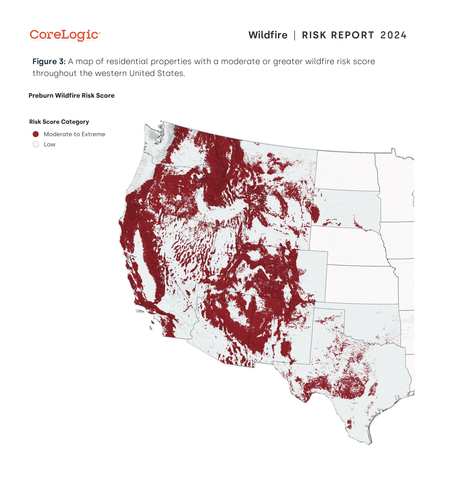Additional study shows mitigation tactics can lead to 75% reduction of expected loss per property
IRVINE, Calif. — (BUSINESS WIRE) — August 13, 2024 — Natural disasters are becoming more intense as a result of changing weather patterns and wildfires are no exception. The 2024 CoreLogic Wildfire Risk Report found more than 2.6 million homes across 14 states are at moderate to very high risk of wildfire damage during the 2024 wildfire season, with a total reconstruction cost of $1.3 trillion. With those figures as a backdrop, the report also highlights the importance of mitigation techniques, both on an individual property and community wide basis—which have benefits for both homeowners and insurers.
This press release features multimedia. View the full release here: https://www.businesswire.com/news/home/20240813649322/en/

CoreLogic's map of residential properties with a moderate or greater wildfire risk score throughout the western United States. (Graphic: Business Wire)
The western United States has the greatest wildfire risk with three states comprising 70% of the risk. The following states having the highest number of homes at moderate or greater risk of wildfire exposure:
- California: 1,258,748 homes at risk
- Colorado: 321,294 homes at risk
- Texas: 244,617 homes at risk
- Oregon: 129,567 homes at risk
- Arizona: 124,603 homes at risk
These states face an elevated level of risk because of the high number of homes in undeveloped areas, or with exposure to Wildland-Urban Interface, where homes are near wildlife such as trees, vegetation and other flammable materials. The Los Angeles metropolitan area leads the nation with the highest number of homes at risk, with more than 245,000 homes with moderate or greater risk of wildfire, representing a total reconstruction value of $186.6 billion although not all homes that experience a loss in a wildfire scenario will be a total loss.
“In recent years, we’ve seen wildfires occur in unexpected places, reinforcing the need to understand the risk landscape and take mitigation action. Both insurers and consumers have a role to play to ensure adequate protection,” said Jon Schneyer, CoreLogic’s director of catastrophe response. “These numbers may seem overwhelming, but research shows that mitigation efforts make a real difference in potential losses from wildfires. The good news is there are actions people can take to lessen the risk.”
Effective mitigation strategies
There have been multiple devastating wildfires in recent years that have highlighted the need for individuals and communities to take mitigation action. For example, the Camp Fire of 2018 decimated more than 90% of the town of Paradise, California. A recent collaborative study with the Town of Paradise, Milliman, Inc, and CoreLogic1 found combining individual home- and community-level mitigation strategies led to a 75% reduction in expected loss per property in high-risk areas like Paradise, which can also lead to lower insurance premiums.
Effective mitigation is a combined effort between communities and individuals. Some mitigation tactics for individuals include:
-
Create a five-foot buffer around the home by removing vegetation, trees, overhanging branches, grass/turf, wood fencing, etc. within five feet of the home.
- Do not store anything—including vehicles—within the five-foot buffer zone.
- Prepare the home with a Class A-fire rated roof, metal gutters, and ember resistant vents.
- Maintain the deck and yard within 30 feet of the home by routinely clearing tree debris, replacing combustible furniture and moving firewood and propane tanks.
Community-level mitigation efforts include:
-
Leveraging Wildfire Informed Development Patterns- the strategic planning of development patterns informed by wildfire risk.
- Selectively decreasing the number of structures within town boundaries, focusing on rebuilding in areas with lower wildfire risk and being intentional with land use planning.
- Implementation of external buffers- well-maintained areas with low fire spread potential on the border of the town.
Additional mitigation tactics can be found through Insurance Institute for Business & Home Safety’s (IBHS) Wildfire Prepared Home Program™ at wildfireprepared.org.
To learn more about wildfire risk and prevention, read the full 2024 Wildfire Risk Report.
About CoreLogic
CoreLogic is a leading provider of property insights and innovative solutions, working to transform the property industry by putting people first. Using its network, scale, connectivity and technology, CoreLogic delivers faster, smarter, more human-centered experiences, that build better relationships, strengthen businesses, and ultimately create a more resilient society. For more information, please visit www.corelogic.com.
©2024 CoreLogic, Inc. All rights reserved. While all of the content, data, and information is believed to be accurate, CoreLogic makes no guarantee, representation, or warranty, express or implied, including but not limited to as to the completeness, accuracy, applicability, or fitness, in connection with the content, data, or information or the products referenced herein and assumes no responsibility or liability whatsoever for the content, data, information, or products referenced herein or any reliance thereon. CoreLogic® is the trademark of CoreLogic, Inc. or its affiliates or subsidiaries.
View source version on businesswire.com: https://www.businesswire.com/news/home/20240813649322/en/
Contact:
Robin Wachner
CoreLogic
newsmedia@corelogic.com


